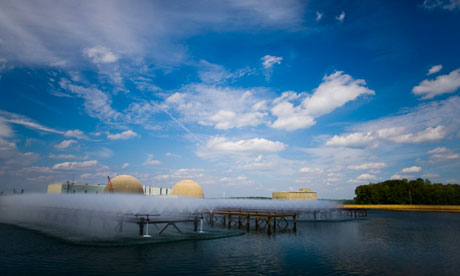Big Nuclear’s cosy relationship with the Obama administration
One year on from Fukushima, the US is rewarding the nuclear energy lobby by underwriting new investment – regardless of risk

-
- guardian.co.uk, Thursday 8 March 2012 15.47 GMT
- Article history

Super Tuesday demonstrated the rancor rife in Republican ranks, as the four remaining major candidates slug it out to see how far to the right of President Barack Obama they can go. While attacking him daily for the high cost of gasoline, both sides are traveling down the same perilous road in their support of nuclear power.
This is mind-boggling, on the first anniversary of the Fukushima nuclear disaster, with the chair of the US Nuclear Regulatory Commission warning that lessons from Fukushima have not been implemented in this country. Nevertheless, Democrats and Republicans agree on one thing: they’re going to force nuclear power on the public, despite the astronomically high risks, both financial and environmental.
One year ago, on 11 March 2011, the Tohoku earthquake and tsunami hit the northeast coast of Japan, causing more than 15,000 deaths, with 3,000 more missing and thousands of injuries. Japan is still reeling from the devastation – environmentally, economically, socially and politically. Naoto Kan, Japan’s prime minister at the time, said last July;
“We will aim to bring about a society that can exist without nuclear power.”
He resigned in August after shutting down production at several power plants. He said that another catastrophe could force the mass evacuation of Tokyo, and even threaten “Japan’s very existence”. Only two of the 54 Japanese power plants that were online at the time of the Fukushima disaster are currently producing power. Kan’s successor, Prime Minister Yoshihiko Noda, supports nuclear power, but faces growing public opposition to it.
This stands in stark contrast to the United States. Just about a year before Fukushima, President Obama announced $8bn in loan guarantees to the Southern Company, the largest energy producer in the southeastern US, for the construction of two new nuclear power plants in Waynesboro, Georgia, at the Vogtle power plant, on the South Carolina border.
Since the 1979 nuclear accident at Three Mile Island in Pennsylvania, and then the catastrophe at Chernobyl in 1986, there have been no new nuclear power plants built in the US. The 104 existing nuclear plants are all increasing in age, many nearing their originally slated life expectancy of 40 years.
While campaigning for president in 2008, Barack Obama promised that nuclear power would remain part of the US’s “energy mix”. His chief adviser, David Axelrod, had consulted in the past for Illinois energy company ComEd, a subsidiary of Exelon, a major nuclear-energy producer. Obama’s former chief of staff Rahm Emanuel played a key role in the formation of Exelon. In the past four years, Exelon employees have contributed more than $244,000 to the Obama campaign – and that is not counting any soft-money contributions to PACs, or direct, corporate contributions to the new Super Pacs. Lamented by many for breaking key campaign promises (like closing Guantánamo, or accepting Super Pac money), President Obama is fulfilling his promise to push nuclear power.
That is why several groups sued the Nuclear Regulatory Commission last month. The NRC granted approval to the Southern Company to build the new reactors at the Vogtle plant despite a no vote from the NRC chair, Gregory Jaczko. He objected to the licenses over the absence of guarantees to implement recommendations made following the Japanese disaster. Jaczko said, “I cannot support issuing this license as if Fukushima never happened.”
Stephen Smith, executive director of the Southern Alliance for Clean Energy, one of the plaintiffs in the suit against the NRC, explained how advocates for nuclear power “distort market forces”, since private investors simply don’t want to touch nuclear:
“They’ve asked the federal government for loan guarantees to support the project, and they have not revealed the terms of that loan guarantee … it’s socializing the risk and privatizing the profits.”
The Nuclear Information and Resource Service, noting the ongoing Republican attack on President Obama’s loan guarantee to the failed solar power company Solyndra, said:
“The potential for taxpayer losses that would dwarf the Solyndra debacle is extraordinarily high … this loan would be 15 times larger than the Solyndra loan, and is probably 50 times riskier.”
As long as our politicians dance to the tune of their donors, the threat of nuclear disaster will never be far off.
• Denis Moynihan contributed research to this column
© 2012 Amy Goodman; distributed by King Features Syndicate
